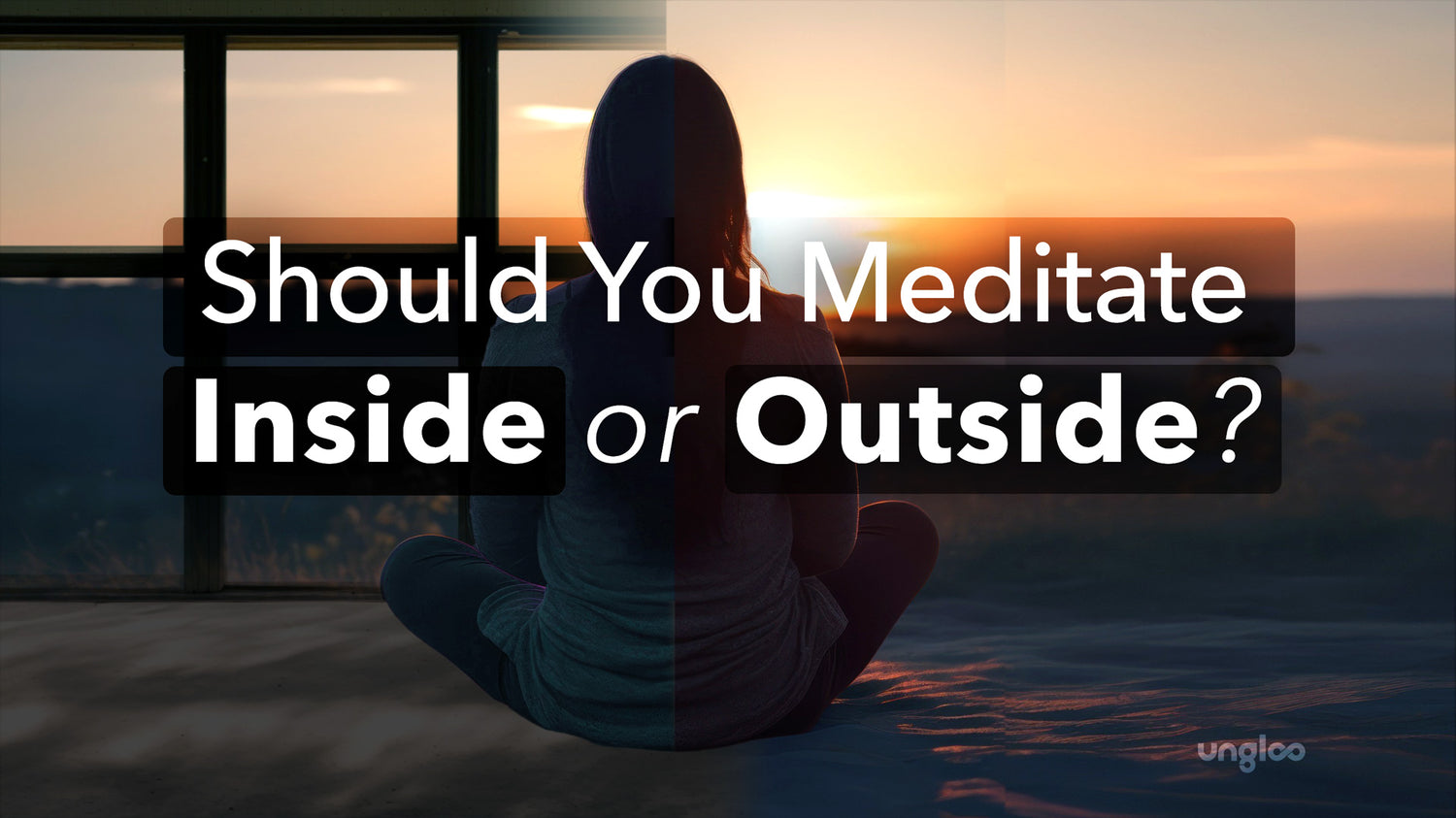Meditation is a practice that can be done both indoors and outdoors, and the choice depends on your personal preferences and circumstances.
Each environment offers its own unique advantages and considerations.
We will explore the benefits and considerations of meditating both inside and outside to help you make an informed decision that aligns with your needs and goals.
Meditation Outside: Connecting With Nature
In the hustle and bustle of modern life, finding moments of tranquility and connection with nature can be a source of rejuvenation.
Meditating outdoors provides a opportunity to escape the confines of indoor spaces and immerse yourself in the natural world.
Walking Meditation
A outdoor walking meditation, offers a blend of physical movement and mindfulness.
As you take slow, deliberate steps on a forest trail or a serene beach, listen as you align your body's motion with the rhythms of nature. This meditative walk can bring a sense of tranquility and balance to your practice.
With each step, you become more attuned to the sensations in your feet, the sights and sounds of nature, and the gentle cadence of your breath.
This synchronization helps you ground yourself in the present moment, fostering a deep sense of mindfulness.
Nature Meditation
A nature meditation allows you to immerse yourself the environment around you.
Whether you choose to sit beneath the shade of a oak tree, by flowing water, or on a quiet mountainside, the goal is to foster a profound sense of unity with the world around you.
Fresh Air
One of the immediate benefits of meditating outdoors is the invigorating breath of fresh air. The crisp, oxygen-rich air nourishes your body and mind, revitalizing your energy and sharpening your focus.
Taking deep breaths, you become aware of the exchange between your body and the environment. It's a reminder that, just like the plants and animals surrounding you, you are an integral part of life.
Outdoor Meditation
Studies suggest that spending time in nature can significantly reduce stress levels. The sights, sounds, and sensations of the natural world have a calming effect on the brain and nervous system, promoting relaxation and emotional well-being.
When you choose to meditate outdoors, you immerse yourself in this stress-reducing environment, amplifying the benefits of your practice.
The soothing backdrop of nature becomes an ally, helping you to let go of worries and distractions and dive deeper into your meditation.
Meditating outside can be a moment of self-discovery and connection with the world around you.
Whether you engage in a walking meditation, nature meditation, or simply sit and breathe in the fresh air, the outdoors provides a rich experience.
It's an invitation to step away from the hustle and bustle of daily life and find solace in the beauty and serenity of the natural world.
Meditating Inside: Cultivating a Sanctuary
While outdoor meditation has its unique advantages, so does meditating indoors.
Here are those advantages of practicing mindfulness within the comfort of your own space:
Meditation Practice
Creating a dedicated meditation space indoors can be a game-changer for building a consistent meditation practice.
This space becomes your sanctuary, a place where you can leave behind the hustle and bustle of daily life and fully immerse yourself in your practice.
By setting up an area that is exclusively reserved for meditation, you signal to your mind that it's time to transition into a state of mindfulness.
Over time, this consistency will help you establish a deep connection with your practice, making it an part of your daily routine.
Focus
One of the primary advantages of meditating indoors is the control you have over your environment and surroundings. Unlike the unpredictability of your surroundings in the outdoors, an indoor space allows you to minimize distractions.
You can close the door to block out noise, dim the lights to create a calming ambiance, and set the temperature to your comfort.
This controlled setting empowers you to spend time to watching thoughts arise. This practice will help cultivate a heightened state of awareness.
Sound Meditation
In an indoor environment, you have the opportunity to explore the subtle nuances of sound meditation without interruptions or other factors.
Sound meditation involves sitting and immersing yourself in various sounds, whether it's the resonance of Tibetan singing bowls, the gentle hum of a fan, or the rhythmic ticking of a clock.
These sound stimuli can serve as anchors for your meditation, helping you focus your attention and attain deeper states of mindfulness. Indoor spaces provide the ideal backdrop for this exploration, allowing you to pay full attention to your senses.
Ungloo Box: Comfort and Support
Investing in a Ungloo Box can transform your indoor meditation experience. This box helps alleviate discomfort and anxiety during prolonged meditation sessions by providing ergonomic support for your spine and hips.
With the physical distractions minimized, you can fully immerse yourself in your practice without the discomfort of aches or numbness. Your Ungloo Box becomes your anchor, ensuring that your focus remains on your inner journey.
Choosing the Right Setting
As you start your meditation journey, the question of whether to meditate indoors or outdoors may be a hard choice to make.
The truth is, there's no definitive answer, it all comes down to your unique preferences and goals. Let's go over the key factors to help you make an informed choice:
Personal Comfort
Consider your personal comfort as the starting point. Some individuals find solace and focus in the serene, controlled environment of their indoor meditation space.
It's a place where you can shut out external distractions, create a soothing, relaxed ambiance, and settle into your practice with ease.
If you're someone who thrives on the quietude and structure of an indoor setting, this space may be your ideal choice.
On the other hand, if you feel most at ease surrounded by the open air, the rustling leaves, and the harmonious sounds of nature, then outdoor meditation practices could be your calling.
Nature has an inherent ability to calm the mind and reconnect you with the natural world.
Purpose: Defining Your Meditation Goals
Your meditation goals play a significant role in determining your ideal setting. Are you meditating primarily for stress reduction, relaxation, and emotional well-being?
Studies suggest that spending time in natural settings can lower depression and stress levels, making outdoor meditating an excellent choice. The sights and sounds of nature can soothe your mind and help you let go of life's daily pressures.
On the other hand, if your meditating centers around deep concentration, inner exploration, or spiritual growth, an indoor setting may be more suitable.
Here, you can create a controlled environment free from external disturbances, creating a more profound and focused meditation experience.
Variety: Embracing the Best of Both Worlds
The beauty of meditation lies in its versatility, and there's no rule that says you must choose one setting.
In fact, many experienced meditators find value in alternating between indoor and outdoor meditation. You can benefit from the unique benefits of each environment. For example, you might opt for indoor meditation during inclement weather or when you seek a tranquil and distraction-free atmosphere.
You can venture to the city park when you crave the inspiration and rejuvenation that nature provides. This variety not only keeps your practice fresh and engaging but also allows you to adapt to your changing needs and moods.
In essence, there is no "one-size-fits-all" answer when it comes to meditation teacher choosing the right setting for meditation.
It's a deeply personal decision that hinges on your comfort, goals, and the desire for variety in your practice. Ultimately, both indoor and outdoor meditation offer valuable experiences, and the choice is yours to make.



